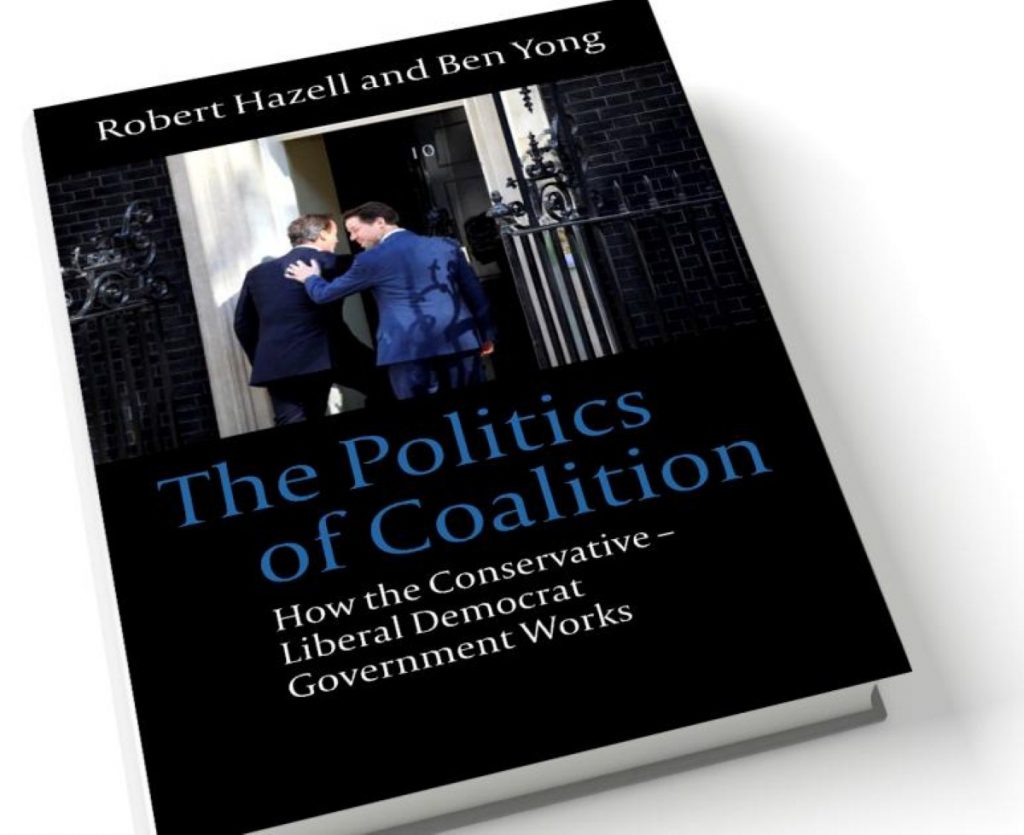Review: The Politics of Coalition by Robert Hazell and Ben Yong
This month sees the publication of The Politics Of Coalition, one of the most significant analyses of the dynamics of two-party government in Britain we've seen since 2010. This work is thoroughly rigorous in its approach, eschewing any kind of narrative in favour of academic assessments of various aspects of life in coalition.
Different contributors pitch in with their own chapters, but it is Robert Hazell of UCL's Constitution Unit and Ben Yong who do much of the legwork. Even for those who spend their days following the mechanics of coalition government there's much of interest here. In the course of their research Hazell, Yong and co have had access inside Whitehall to senior advisers and staff, giving them insights into the way the coalition works behind closed doors.
Nowhere is this more so than when it comes to the machinery of government. There is little use of the coalition's dispute resolution committees, which are firmly put in their place as being of use in emergencies only. For most matters more informal measures are used: although less rigid their significance is assessed carefully.
Inevitably, themes emerge through the book's different threads. The biggest dilemma seems to be the tension between unity and distinctiveness: an ever-changing pressure which will get more and more acute as the 2015 general election approaches. Not that the Conservatives and Liberal Democrats will necessarily make it that far. The idea that the Lib Dems could revert to a confidence-and-supply arrangement, if they are able to find a justifiable 'casus belli', is one of many intriguing ideas raised. Another is the idea of electoral pacts, either formal or informal, in 2015: desperate times could just convince the Lib Dems that this sort of desperate measure is required.


Works like this are not supposed to weigh in heavily on one side or the other, but the authors can't help but make judgements about how the coalition partners have done. They started strongly, of course, in terms of the smooth functioning of government. But in the longer-term their future is less secure. The Lib Dems come in for special criticism: their too-subtle approach to differentiation isn't met with much approval. The Conservatives are told the sensible thing to do is to keep killing the Lib Dems with kindness by acquiescing to their policy wishes. Interesting to note, then, that Tory backbenchers are too sensitive to cope with much in the way of compromise at all.
It is Hazell's final chapter, on the lessons learned by coalition politics for the future, which is the most intriguing. Come the next general election he recommends that the political parties' manifestos need to be more specific in their commitments where they are red lines, and more vague in their policies where there is room for negotiation in another hung parliament scenario. He'd like to see more time for coalition talks to take place, too, so that rash decisions aren't blundered into quickly. The smaller party needs to think about what is achievable, he suggests, and not over-reach themselves. The larger party's leader must make sure he looks after his own party's interests as well as those of the junior party.
The problem with academic works is their lag time: unlike journalism, that first draft of history, they like to take their time and actually do some proper work before coming to conclusions. So it's going to be difficult for assessments of the coalition to sink in before we enter this parliament's endgame. Nevertheless, there are relevant conclusions which both David Cameron and Nick Clegg would do well to take heed. The need for midterm renewal, and the ways in which the leaders could keep their parties onside, will prove critical as the "harmonious and unified" early period this book analyses becomes a thing of the past.
The Politics of Coalition, by Robert Hazell and Ben Yong, is out now in hardback published by Hart Publishing. 290 pages.

